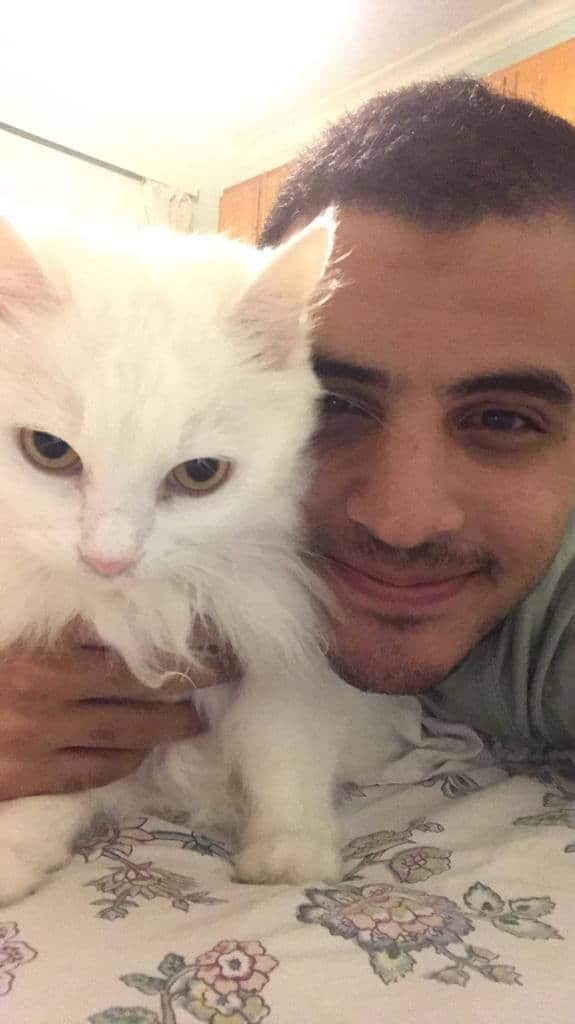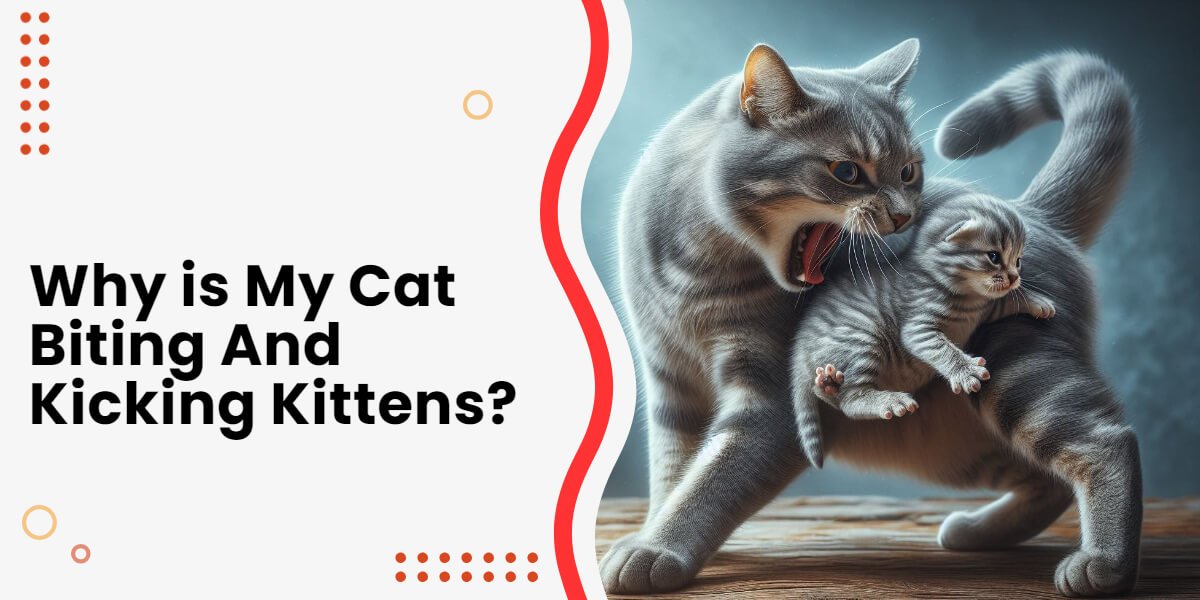Witnessing a mother cat seemingly roughhousing with her precious kittens might raise concern and curiosity among cat owners. The sight of a mother cat biting or kicking her babies can be puzzling, even concerning, but fear not – there’s a method to this apparent ‘madness.’
In this comprehensive guide, we’ll delve into the intricate world of feline maternal behavior, uncovering the reasons behind why mother cats display these behaviors towards their kittens. Exploring the nuances of their instincts and interactions, we’ll shed light on this natural phenomenon. Join us on this enlightening journey as we decode the behavior of mother cats, offering insights and guidance to reassure and empower cat owners navigating this fascinating aspect of feline parenting.
Table of Contents
Mother Cat Biting And Kicking Kittens: A Summary
Mother cats may bite and kick kittens to teach survival skills. However, inexperience, jealousy, or detecting disabilities can also trigger aggression. Unless serious injuries occur, separate kittens if targeting persists. Provide care, consult a vet on medical issues, and facilitate gradual reunification. With patience, reconciliation success is high.
Why Your Cat Is Biting And Kicking Her Kittens
There are multiple reasons your cat might be acting a tad bit aggressive towards her newly born kittens. While it is entirely normal most of the time, there are other times when it can get a little out of hand—knowing when you need to interfere and when not to is essential as their owner.
The main reason you’ll see a mother cat act roughly towards her kittens is that she’s trying to show them the skills needed to survive in the real world. She’s likely demonstrating how to act, fight, and hunt for whatever situation they may encounter away from the safe comfort of their home.
She might also be trying to make them understand that she’s the one in charge as long as they’re in the house.
Usually, you won’t need to interfere here as the mother is not doing any real damage to her kittens. However, This is not always the case. Here are all the reasons why your mother cat is rough towards her kittens and what you can do to help them.
Young Cats With No Maternal Knowledge

There are cases where the mother cat is still a kitten herself. Being a few months old, young cats usually don’t know how to deal with their newly acquired responsibilities.
They’re often confused, so they either look for help from you, or they’ll unknowingly play a little too hard with their kittens. Of course, this might cause the kittens some distress from the rough treatment.
Usually, cats like this will carry their kittens around a lot, accidentally sit or sleep on them, kick them multiple times while playing, and not give the kittens the attention they need.
Related: How can I help a kitten who is trying to nurse on a spayed cat?
Cats Get Jealous Too!
Another reason why your cat is being violent towards her kittens is jealousy. While pregnant, cats are usually showered with love and care by their owners. Getting cuddled whenever they needed, provided with the best food quality, and seeing their bowl full without them needing to demand a refill.
Throughout this period, your cat gets used to this undivided attention.
However, once they give birth, they might feel like you’re focusing a little too much on the new family additions and neglecting them.
Even if you aren’t necessarily ignoring the mother, her being used to your complete attention before all of this ordeal will cause her to get jealous of her kittens. And in return, act aggressively or ignore them.
Sick Or Deformed Kitten
Most of the previous cases were on the mild end of the spectrum, with your mother cat simply being rough with her kittens but not causing any actual damage.
This, unfortunately, is not always the case. There are situations in which your cat will take it too far and seriously injure her kitten, or in a worst-case scenario, kill it.
Cats tend to do that when there’s something wrong with the kitten —It can either be a type of deformity or sickness—sometimes, there’s nothing wrong at all, but you’ll notice that your cat is still hurting the kitten or completely neglecting it.
Users Also Read:
– How Can I Stop My Cat From Messing Up The Carpet?
– Is it Safe to Have a Hamster With a Cat at Home?
– Why is My Cat Smacking its Lips While Sleeping?
How You Can Help Your Cat When This Happens
The best thing to do when you notice your cat hurting her kitten to the point of injury or bleeding is to separate them. Make sure to keep the mother away from the little one as much as possible. Only allow interaction when you’re there to supervise them, so you can intervene if anything dangerous occurs.
In cases like this, the kitten is usually too young and still requires maternal care, so be sure to keep her warm as much as possible, help her when it’s time to use the litter box, and provide her with the needed nutrition to eat.
If it’s too soon to feed her normal food to replace her mother’s milk, you can feed her kitten formula specially made for baby cats.
Try to avoid giving her regular cow milk or milk intended for human babies as much as possible because they might cause her to become sick later on.
Make sure to arrange an appointment with your vet and take both the mother and all her kittens to check for any abnormalities and for tips on how to deal with them.
Preventing Future Issues
To help prevent maternal aggression issues in the future:
- Make sure to properly socialize mother cats from a young age before considering breeding. Expose them to a variety of people, animals, sights, sounds, and handling techniques to build confidence.
- Consider spaying/neutering your cat if you do not plan to intentionally breed. This will protect against unwanted litters that an owner may not be fully prepared for.
- Only choose appropriate breeding ages and temperaments. Use cats over 1-2 years old who have demonstrated positive interactions with humans/other pets. Avoid breeding nervous, anxious, or aggressive cats.
When to Seek Veterinary Care
If you notice any significant injuries, bleeding, or signs of illness or distress in separated kittens, promptly seek veterinary care. Kittens may fail to thrive or have additional medical needs without maternal care.
A vet should also evaluate any kitten that continues to be aggressively targeted when reintroduced to the mother. They can check for underlying health issues and provide guidance on the next steps.
Recommended: I can see my cat’s heart beating, is that normal?
Facilitating Reunification
When working to reunite a kitten and mother cat, use techniques like:
- Rubbing a cloth on the mother cat then the kitten to exchange scents
- Allow brief, supervised interactions multiple times per day
- Provide hiding spots for the kitten to retreat if needed
Confirm the mother cat is exhibiting normal nursing and nurturing behaviors before leaving them alone unsupervised again.
Long-Term Impacts on Kittens
Kittens separated early from a mother cat may experience:
- Trouble learning appropriate social behaviors
- Fear, anxiety, or aggression issues
- Struggles bonding with humans or other animals
Make sure to expose the kitten to positive interactions with people and pets. Consult with a vet or behaviorist if problems emerge. Stay alert for signs of emotional distress like hiding, loss of appetite, lethargy or extreme clinginess in separated kittens.
Conclusion
In this article, we discussed the multiple reasons why a mother cat is biting and kicking kittens and how you can help them get through this phase. Hopefully, after close supervision and, of course, love and care towards both parties, the mother and kitten can return to each other’s side.
And you can finally spoil the little feline family as much as you were looking forward to!

I’ve been living with cats since 2008 and I can confidently say I have more feline friends than humans lol. I currently live with 5 cats in different life stages; two of them are less than one year old, one is 2-ish years old and the oldest two are 9-ish years old. I’ve developed a strong bond with cats over the years and I’m eager to share my experience through this blog. You can learn more about my cats here.

